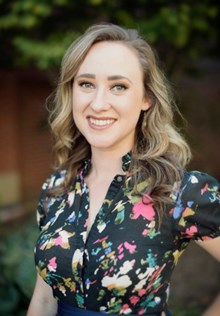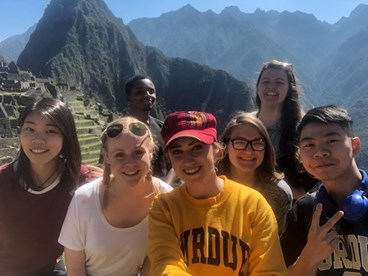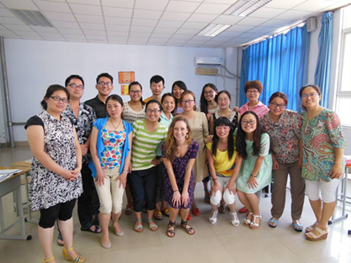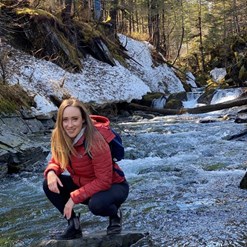Getting to Know Heather Offerman
Class of 2009

Major(s): Spanish
Minor(s): Psychology
Degree(s): Bachelor of Arts (BA) Spanish 2009; Master of Arts (MA) Spanish Linguistics 2014; Doctor of Philosophy (PhD) Spanish Linguistics 2020
Hometown: Evansville, IN
Job History/Current Job Title: During my time at USI, I taught English as a Second Language classes 1-2 times a week for a year. Once I began my Master´s, and later my Ph.D., at Purdue University, I taught Spanish language, culture, and linguistics courses. I additionally taught intercultural communication courses through the Center for Intercultural Learning, Mentorship and Research for 3 years, also during my time at Purdue. Between my Master´s and Doctorate, I took some time off from graduate school to take an opportunity to teach abroad at the Nanjing University of Science and Technology in China, where I taught graduate-level English courses and undergraduate-level Spanish courses. Currently, I serve as the Spanish Language Coordinator as well as a Spanish Lecturer in the Hispanic Studies department at Davidson College. This year is my tenth year of teaching classes at the university level!
Q&A with Heather
What did you want to be when you grew up?
As a young child, I remember making my own versions of a “desk” and a “chalk board” for my 3 year-old brother and telling him that I was going to be his teacher and help him learn – I think I’ve always harbored the desire to become an educator and facilitate learning opportunities and support for others.
Why did you choose USI?
I am an Evansville native, and initially I chose USI since it was the most financially feasible at the time and close to my family. However, after my first year, I realized what a gift it was to be able to get to know my professors in smaller-sized classrooms and receive more personalized feedback. This is probably my favorite thing about USI; I felt a sense of community among students and professors.
What inspired you to pursue your career path?

I remember having many wonderful educators throughout my life (elementary, middle, and high school, as well as at USI) who I admired not only because I learned a lot from them, but also due to the evident care that they encompassed for all of their students. That was the main thing I learned from them and that I now strive to do in my own teaching. In terms of research, I never thought that I enjoyed it until I worked with Dr. Norma Rosas Mayén at USI. When she shared her research, I could always see the joy that it brought her, and I knew that, just like her, I loved languages and linguistics and wanted to find an area that was as intellectually challenging as it was motivating in terms of helping others (my current research focuses on investigating and comparing various pedagogical practices and assessing which are most useful in helping university-level students develop and acquire a second language).
Which teacher(s) had the most impact on you during your time at USI? Why?
I remember during my first semester, the first Spanish course that I took at USI was Spanish 101 with Mercedes Hayes. She was wonderful; she pushed us to speak, which had not been my experience in language courses I took in high school, and she was very encouraging. Additionally, that first semester, I took a composition course (I believe it was a requirement) with Dr. Matthew Graham; this was the first time anyone had provided me with constructive criticism and thorough feedback on my writing abilities, and to this day, I still reflect on certain comments he provided, as they helped to develop tremendously as a writer. Next were Dr. David Hitchcock and Dr. Guillermo Latorre, some of the Spanish faculty. I had just solidified my decision to become a Spanish major, I had completed my semester abroad in Mexico, and I was taking upper-level Spanish courses for the first time. With Dr. Hitchcock, I recall having my first discussions about applying for graduate school. He was very instrumental in this process, as he met with me fairly frequently to discuss any concerns or questions I had about the application process and how to best prepare for graduate school. Additionally, I remember taking my first course with Dr. Latorre and how encouraging he was; on multiple occasions, he took the time to acknowledge my growth and development in my Spanish language and linguistic skills. Once I decided to apply to graduate school, I remember calling to ask him for the recommendation (which I was so nervous about!), and, after he graciously agreed, he offered some invaluable advice on how to plan and strategize my time well in graduate school for a linguistics program. Finally, during my junior year, I took Spanish Diction with Dr. Norma Rosas Mayén. I immediately fell in love with the topics of phonetics and sociophonetics that we covered in the course, and I also observed and admired the passion that Dr. Rosas Mayén embodied for linguistics. At the time, I had very little familiarity with these topics, and I also experienced a lot of insecurities about choosing linguistics as my area of focus for graduate school; but, Dr. Rosas Mayén was very patient and encouraging. She believed in my abilities and my drive to learn, grow, and thrive as an academic. I am certain that, without these professors, I would not be where I am today.
Were you involved with any clubs or internships?
One internship through USI that comes to mind is one in which I taught English as a Second Language to adults that had recently come to the U.S. from primarily Spanish-speaking countries. This was a really great opportunity that helped me to not only gain some teaching experience, but also to get to know others from the community and be able to hear their experiences as first-generation immigrants to the U.S. I was very unaware at the time of the many hardships they faced being in a new country, and I felt honored to be able to hear their stories and learn from them. Additionally, there are so many privileges I realized I had growing up in the U.S. as a white, straight, middle-class, cis-gender, non-immigrant woman, and this experience was one of major catalyst that caused me to begin to address these privileges.

What are some highlights as you’ve advanced in your career path?
I think one highlight was recognizing the reality of “imposter syndrome” (it will make sense later why I consider this a highlight!). I have struggled with this for years, feeling self-doubt with respect to my abilities and the field I am in, and I remember my graduate school advisor expressing his own struggles with imposter syndrome. Ironically, these conversations with him really helped bring me some confidence because I knew I wasn’t the only one. I was then able to embrace the fact that I can’t know everything, and it’s always ok to say, “I’m unsure about that, but I will look it up and get back to you.” I’ve carried that with me at professional conferences, in writing my dissertation, in publishing articles, in my teaching, and also in coordination for my current position.
Do you have any advice for current students, either that someone gave to you or just something you wish you would have known?
“Don’t stop just because you think you can’t do it – you can do it, but you’ve convinced yourself that you can’t.”
I think that was some of the best advice someone ever gave me. As I mentioned with suffering from imposter syndrome, I was experiencing a lot of self-doubt in graduate school, and I almost quit my PhD because I didn’t think I could do it/ I thought I wasn’t the right “type” for academia. I realized that I was basing my perceived abilities based on others’ thoughts and opinions and therefore greatly limiting myself. It took a long time for me to see that there is no “type” for academia and that the only person who could hold me back was myself.
Something I wish someone had told me is that it is ok to take breaks and to RELAX. In undergrad and grad school, I felt guilty if I was not constantly working and perfecting something. First, I had to learn how to throw this notion of “perfect” out the window – there is always room for improvement but trying to hit your idea of perfect will either drive you crazy or cause you to lower your standards, settle, and lose your drive. Second, learning how to mentally shut off your brain every day and take an hour or two for yourself is so necessary. If you are working constantly, you’ll soon become burnt out constantly and not be able to perform at your best. So, take that yoga class, watch that tv show, have that beer with your friends; take time out of your day to care for yourself and the relationships that you value.
What is on your desk right now?
A coffee cup that says, “Cat mom,” exams awaiting to be graded, my laptop, and a small but very green succulent.
If you had an all-expenses paid trip to go anywhere in the world, where would you go and why?
Colombia (any city); I have many friends I met in grad school that are either from Colombia, lived there for a time, or are living there now. I would love to see and travel through Colombia, but mostly I would want to visit these friends and learn more about their home.
What are the top 3 things on your bucket list?
Visit all of Latin America, learn a third language fluently (I know 3 other languages besides Spanish and English but very minimally), and become a certified fitness trainer in some capacity.

What is your favorite quote?
“People will forget what you said, people will forget what you did, but people will never forget how you made them feel.” – Maya Angelou
Learn more about Dr. Offerman:
https://www.davidson.edu/people/heather-offerman
https://heatherofferman.wixsite.com/summary
Interview conducted by Aubrey Swart '22
| Sean Nicholl '10 Performing Arts |
Ellen Small Billard '05 English |
Sara Beth Vaughn '11 M '12 English |
Shawn & Calvin Williams '18 Professional Studies |
| Christy Skie '07 Sociology |
David Staples '09 History |
Christy Morley '19 Social Work |
|
| Maria Nguyen '15 Anthropology |
Tiffany Coles '19 Psychology |
Lauren Anderson '09 Sociology |
|
| Hope Baker '20 English Literature and Global Studies |
Alex Bailey '14 Art and Design |
Holli Melton '19 Political Science, Emphasis Public Administration |